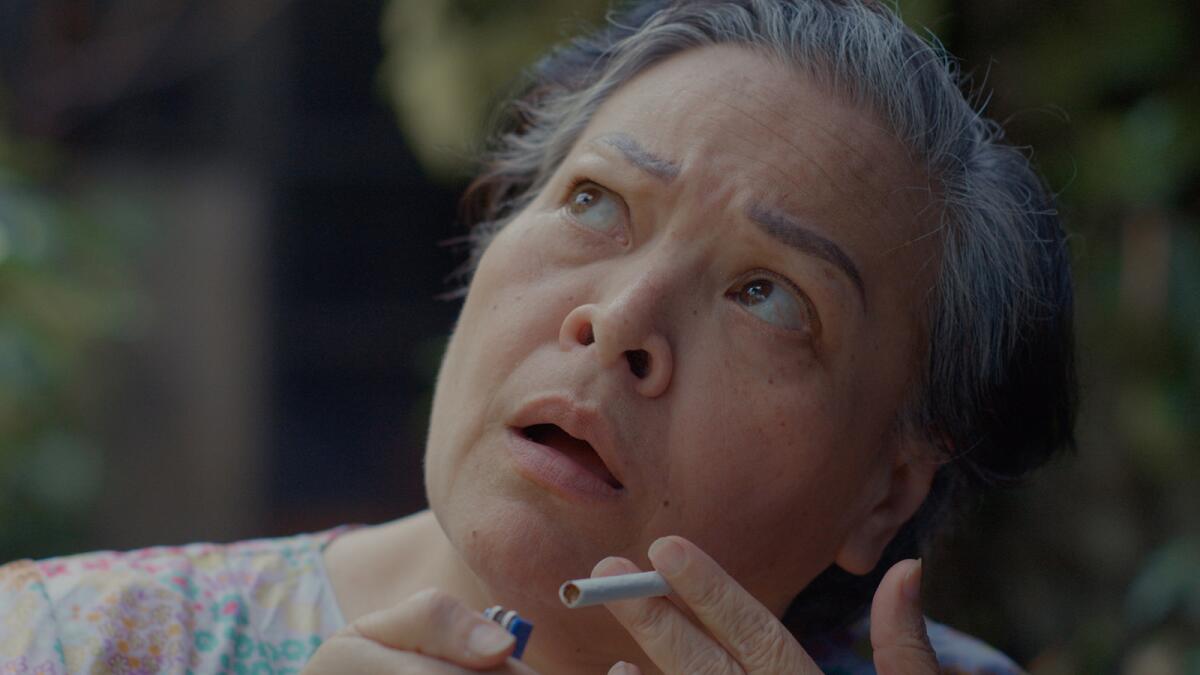‘Leonor Will Never Die’s’ wonderfully weird salute to Filipino exploitation flicks

- Share via
Equal parts midnight movie, psychodrama and reality-tripping goof, “Leonor Will Never Die” counts as one of the year’s most wonderfully offbeat debuts. Filipino writer-director Martika Ramirez Escobar’s melancholically weird salute to the escapist pull of ridiculous movies, as experienced by a has-been action director in a life-or-death scenario, is a first feature of such compact spirit and invention that it could also be mistaken for some wily veteran’s prankish cinematic swan song.
Either way, this Sundance jury prize-winner is a heartfelt lark full of deadpan comedy and parodic bliss, starting in the real world, but not lasting there long. Doddering, distracted Leonor Reyes (Filipino singer and theater star Sheila Francisco) lives in a cramped, unassuming house in Manila, many years removed from her heyday making violent, crowd-pleasing hits for the Filipino movie industry. Now she watches television all day long and forgets to pay the electricity bill, to the consternation of her grown son Rudie (Bong Cabrera), a nervous sort who wants to move out but worries that Mom won’t be able to take care of herself.
For your safety
The Times is committed to reviewing theatrical film releases during the COVID-19 pandemic. Because moviegoing carries risks during this time, we remind readers to follow health and safety guidelines as outlined by the CDC and local health officials.
There’s also the matter of her unfinished mourning over the long-ago death of another son, Ronwaldo, who is a watchful presence as an adult ghost (played by Anthony Falcon), and the name of the action hero in an unfinished script Leonor starts working on again in the hopes of ending her retirement.
That dream hits a snag, however, when an upstairs neighbor’s dropped television puts Leonor in a coma. But inside her subconscious, she’s given entry into her own movie, crossing paths with her invented Ronwaldo (Rocky Salumbides), a sweaty, strapping laborer seeking to avenge his brother’s murder while on the run with a sadistic gangster’s escaped girlfriend (Rea Molina). And now with a housedress-wearing lola tagging along, strangely familiar with everything happening, including what anybody’s going to say at any given moment.
When it comes to Escobar’s film within a film, one need not be conversant in the particulars of ‘70s and ‘80s Filipino exploitation movies to appreciate her amusingly specific pastiche, because certain details are universally culty: the lurid colors of grainy film stock, zoom-ins, overwrought menace, a chugging bass-and-synthesizer score (courtesy of Alyana Cabral and Pan de Coco), and fight scenes of unfussy blockiness that occasionally require a slow-motion stunt being shown two times in a row.
Escobar’s genuine fondness for the genre’s absurd pleasures is palpable, especially how Carlos Mauricio’s nostalgically pulpy cinematography in those sections stands in stark contrast to the digital dryness of the present-day scenes and their fixed compositions. But also, in Leonor’s need to solve her emotional turmoil through a fantasy rewrite of her life’s great tragedy, Escobar layers in some healthy interrogation about our own relationship to movies as an escape hatch from reality.
Eventually, Escobar finds a way for Rudie to come to his own epiphany about why his mother mysteriously disappeared from her hospital bed, and what it might take to bring her back. And yet even when reality shifts again, the frisky “Leonor Will Never Die” refuses to adhere to what we might expect from a story about people trying to write the perfect conclusion to their dilemmas.
That “Leonor Will Never Die” doesn’t exactly know how to end isn’t even all that disconcerting, because the whole mood — from the performances (especially Francisco’s) to the pacing — suggests something being devised as it goes along, inspired by what’s heartfelt one moment, drolly silly the next. When you sense things coming to a close, it’s as if last call has been announced and there’s a need to sober up with a smile: there’s a little meta-narrative, a poignantly beatific touch, even some singing and dancing. As “Leonor Will Never Die” parties to its close, Escobar reminds us that while life is unerringly finite, cinema is the complicated, messy, riotous love affair that never has to end.
'Leonor Will Never Die'
In Tagalog and English with English subtitles
Not rated
Running time: 1 hour, 39 minutes
Playing: Alamo Drafthouse, downtown Los Angeles; Laemmle Monica, Santa Monica; Laemmle Glendale.
More to Read
Only good movies
Get the Indie Focus newsletter, Mark Olsen's weekly guide to the world of cinema.
You may occasionally receive promotional content from the Los Angeles Times.









